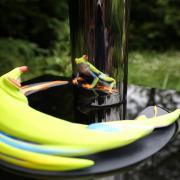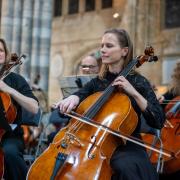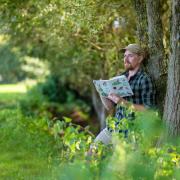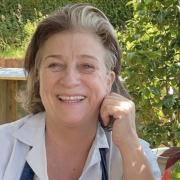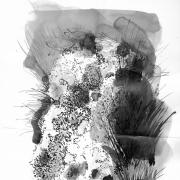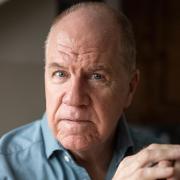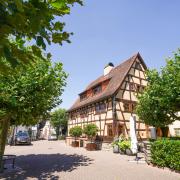What connects a Devon fiddle player with an interest in world music and a mystic, missionary and poet who could become England’s next saint? Stu Lambert found out when he met Phil Berthoud
Phil Berthoud (pronounced Bertoo) has played and taught music for decades. During the pandemic, he combined his passion for traditional music with his deep admiration for the life of his extraordinary godfather, John Bradburne - a man who became a secular missionary in Rhodesia, (now Zimbabwe), and was killed by rebel soldiers in a civil war in 1979. Bradburne is in the process of being beatified – he could become England’s next saint.

Phil has played folk fiddle in London, Brighton and in South Devon, where he has lived since 2000. He has published numerous books on playing techniques for fiddle, mandolin and guitar as well as musical scores for traditional tunes from the folk circuit. Strikingly, he has also written about playing world music on each of these instruments. ‘The books mainly cover playing the instrument and using great traditional tunes from around the world. East European, South American, Middle Eastern.’
Soon after that, when coronavirus hit and lockdown closed schools and concert venues, Phil’s schedule suddenly cleared. He recalls: ‘There was no teaching, no gigs, so suddenly I had all this free time. I’d had in my mind for quite a long time to do a project related to my godfather, John Bradburne. So, there I was in my little studio in Kingsbridge – no people around, no traffic – with my son Louis working on his music degree in the next room.’
With help from his family, Phil has recorded two albums inspired by Bradburne and using his poetry and song, with all profits going to the Mutemwa Leprosy Settlement in Zimbabwe, where Bradburne cared for the sick in the 1960s and 1970s.

The story of John Randal Bradburne is a remarkable one. Described as a pilgrim, a hermit, a poet, a musician, a mystic, and a theologian his journey started in Cumberland.
Born in Cumberland, he was one of five children, his father was rector of Skirwith and his mother was born in India. At the outbreak of the Second World War, due to his mother’s family connections he volunteered for the Indian Army and was posted to Malaya as an officer with the 9th Gurkha Rifles in 1940. He spent a month living in the jungle following the fall of Singapore in 1942 and tried to escape by sailing to Sumatra. He was shipwrecked the first time and rescued by the Royal Navy on his second attempt. He resigned his commission due to ill-health in 1946.
Bradburne returned to England as a man with a strong Christian faith. He became a Roman Catholic and in the late 1940s spent some time with the Benedictine monks of Buckfast Abbey in South Devon. He soon took to wandering through Europe and the Middle East. After training as a novice monk in Leuwen, Belgium, he walked to Rome – over 1,000 miles – and spent a year living in the organ loft of a church in a mountain village, where he played the organ. On his return to England, Bradburne lived as a hermit on Dartmoor and eventually became a sacristan at Westminster Cathedral.
In 1962 he travelled to Rhodesia, at the invitation of a Jesuit friend, to minister to inhabitants of the Mutemwa Leprosy Settlement. He became the warden of the settlement but was dismissed when he refused to reduce levels of care. He then lived in a tin hut nearby for the last six years of his life, continuing to care for the residents until he was abducted and killed by the Zimbabwe African National Liberation Army in September 1979.

‘My father, Patrick Berthoud, was editor of a Catholic magazine in Zimbabwe called The Shield, for which John contributed poetry, an interview and helped with proof-reading,’ says Phil. ‘John would come and stay at our house in Harare, he and my parents were great friends.’ They asked John to be a godparent and Phil has a picture of him at his christening in 1966, though he has no recollection of meeting him. ‘Even though my family left Africa when I was three, I’ve long felt his influence in my life.’ And this has finally manifested in not one, but two albums, both recorded in Devon and featuring the voice of Phil’s wife Mahrey.
The first album The Thought Expressed sets Bradburne’s poetry to arrangements that include electronic orchestral sounds as well as traditional instruments, giving a more lavish soundscape than folk music offers. Mahrey’s voice is given a modern sheen too; with the often stately, hymn-like pace of the songs The Thought Expressed can appeal to a wider audience than folk fans. There was plenty of material to choose from for the lyrics - Bradburne is credited with writing 6,000 poems, which are collected in ten books published by The John Bradburne Memorial Society.
The second album In the Footsteps of the Vagabond explores the traditional music of the places Bradburne called home – Cumbria, Norfolk, Devon and Zimbabwe - sometimes blending these, as in the song The Perfect Cure, in which hot, hypnotic African rhythms and sinuous slide guitar underpin familiar-sounding folk melodies on guitar and fiddle.
In the Footsteps of the Vagabond is a Berthoud family affair. Phil and Mahrey are accompanied by their son Louis on drums and percussion. ‘Louis was living at home working on his music degree at the time, so I gave him a couple of albums of Zimbabwean music to listen to and said, “I'll pay you to go in the studio and play. Just do whatever you want inspired by that”.’ Around half the album is underpinned by Louis’ recordings. Phil and Mahrey’s daughter Rhianna designed the artwork for the album, and her partner Billy Tucker mixed and mastered the recordings.

Phil researched collections and notebooks of traditional tunes from the regions. ‘These tunes would probably have been passed on by ear,’ he says. ‘Then some musicians, who were able to write music, would transcribe tunes and put them together in notebooks or collections.’ The written music, though, only gives half the story. The same music played by musicians from different places will have its own unique sound.
‘Cumbrian tunes have a Scottish flavour to them and are more varied than southern tunes, because they are played on fiddle, which is versatile,’ Phil explains, ‘while the melodeon is used a lot in southern styles and the tunes are very much restricted to keys that are comfortable to play on in - D and G major.’

As well as the field recordings Louis used, Phil listened to mbira (African thumb piano) and Zimbabwean guitar music. ‘A lot of African music is in 6/8- and 3/4-time signatures which suits the rhythm of the British jig really well!’
While much of the album is instrumental, Mahrey sings on three tracks, including Skirwith, Cumberland, a setting of a John Bradburne poem to a Cumberland air documented in 1762. Bradburne himself is heard singing the traditional song Seventeen Come Sunday from a tape recording he made in Rhodesia – a poignant piece of aural history for the family.
Bradburne is remembered reverently in Zimbabwe. In 2001, the Archbishop of Harare was petitioned to inquire into Bradburne’s canonisation and the lengthy process of declaring him a martyred saint is now under way. An annual memorial service at Mutemwa always draws large crowds. The anniversary of Bradburne’s death was also marked at Westminster Cathedral in 2009 and 2019.
Phil Berthoud is keeping that flame alive. His two albums celebrate the poems of his godfather, and all profits from the CDs go to the cause that was close to John Bradburne’s heart, the Mutemwa Leprosy Settlement.
philberthoud.com




